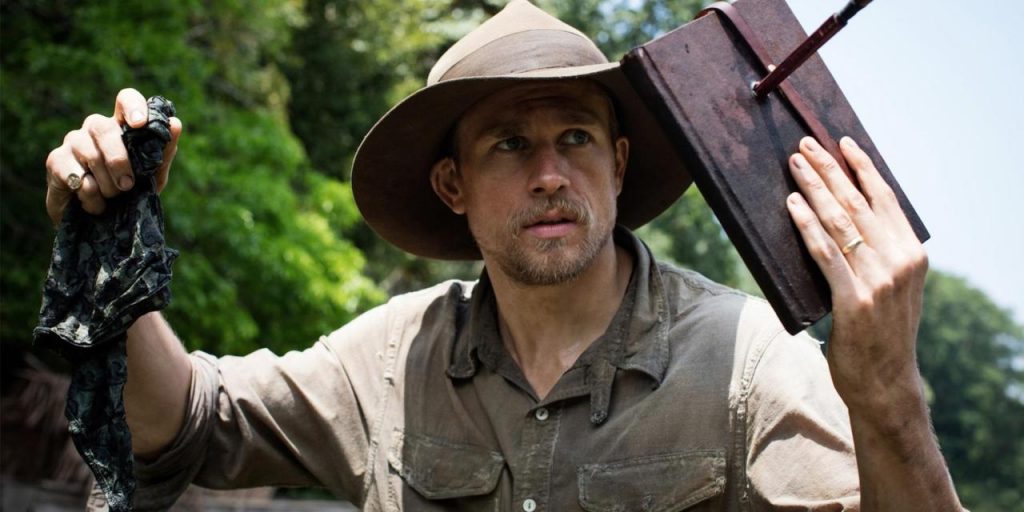Going Gently Into That Good Night, by Tober Corrigan
22 Apr
“Ah, but a man’s reach should exceed his grasp,
Or what’s a heaven for?…”
This portion of Robert Browning’s poem, “Andrea del Sarto,” directly referenced in the final moments of The Lost City of Z, sums up both the film’s form and its function. For it is James Gray, directing with his usual grace and manners, that leads us by the hand for two and a half hours, imploring us to reach for the ineffable each time Percival Fawcett, the title character upon whose real story this movie is based, does. Like Fawcett, the reach for heaven ultimately fails, but in the way Samuel Beckett (“Try again. Fail again. Fail better.”) would approve. It’s the sort of failure one can expect to learn much from.
By now it’s no surprise to call Gray’s aesthetic nostalgic. Much has been said of his previous films being studies in style of the classical Hollywood tradition. Yet City of Z seems to be working with nostalgia on more levels and with greater intention than anything Gray’s done previously. There exists, for example, inherent nostalgia in the making of a period adventure film at all, a genre too vaguely between the summer action film and prestige Oscar drama to survive. The death of the mid-level epic has been lamented by many, Gray chief among them. That the film was made at all proves a minor miracle, though seeing the endless crawl of producer credits at the movie’s start shows just how close we got to not seeing it. In a scene late in the film, Fawcett takes his son to an outdoor theater in the middle of the Bolivian jungle where, on his first expedition, he had seen an opera. The theater and stage remain, but absent of people and decaying from decades of neglect. Substitute Gray for Fawcett and the audience for the son and it’s hard not to find the analogy, of this being Gray’s effort to film for us the hollowed vestiges of a once-vibrant cinematic tradition.
For those worried that a bigger budget and pre-existing source material would take Gray out of his element, fear not. City of Z proves to be just as contained as his previous character pieces. If anything, the film’s intrigue is only heightened by its juxtaposition between what is expected from the genre and what actually happens. Fawcett, a young, low-ranking army man who lusts after medals and recognition, is given his shot at fame and glory through surveying uncharted South American jungles. Alongside him in the journey are two trusty sidekicks (including an admirably restrained Robert Pattinson). Combine this with the dreadful unknown of the jungle and one seems set up for an appropriately by-the-numbers adaptation of an H. Rider Haggard novel.
Instead, the script transcends its source narrative by obsessing itself with Fawcett’s own obsession over an ancient utopian civilization he believes exists, and in consequence the constant obstruction the domestic space proves in being to his pursuits. This is seen in the constant cutting back and forth between Fawcett’s subsequent journeys and returns home. Like a wave at high tide, the film takes Fawcett and his band deeper into the jungle with each visit, only to reel them right back to England before reaching the heart of the mystery. It’s the sort of narrative move anathema to traditional three act structures. Thankfully even the more expected moments, namely the tension between Fawcett and his family resulting from his being an absent husband and father, are acknowledged but given minimal attention. Not unlike Close Encounters of the Third Kind, the wonder comes in the cinematic exploration of a man vowing himself to a monastic preoccupation with the otherworldly and slowly swearing away the other, more worldly responsibilities of a society man in the process.
The greatest criticism against the film, as in so many of Gray’s others, comes in the frank and rather stilted presentation of the film’s melodrama. Despite an unorthodox portrayal of Fawcett from Charlie Hunnam and satisfying work from Sienna Miller (Fawcett’s wife) and the rest of the supporting cast, the script often has characters speaking in obvious platitudes, saying too exactly what is on their mind. Certain emotional moments, especially from the Fawcett children, feel unearned. This could be due to lack of screen time or to character development assumed rather than lived out. The schizophrenic time jumps and strange allotments of screen time given to characters add up to an experience both scattered and at war with itself. Since the film’s visual language primarily preoccupies itself with will and spirit rather than flesh and blood, the above criticisms must be counted as collateral damage. The final twenty minutes, with a quiet intensity only rivaled by the climactic apostasy of last year’s Silence, moved me enough to abolish any of the ill will built up from the film’s first two hours.
I fear The Lost City of Z will be as misunderstood in its time as his last film, The Immigrant, was upon its release. Given the genre’s trappings, Gray’s latest promises a bang but leaves us only a whimper. Yet in a cinematic age of chaotic editing and over-inflated stakes, a whimper can be a welcome spiritual and cinematic relief.




No comments yet